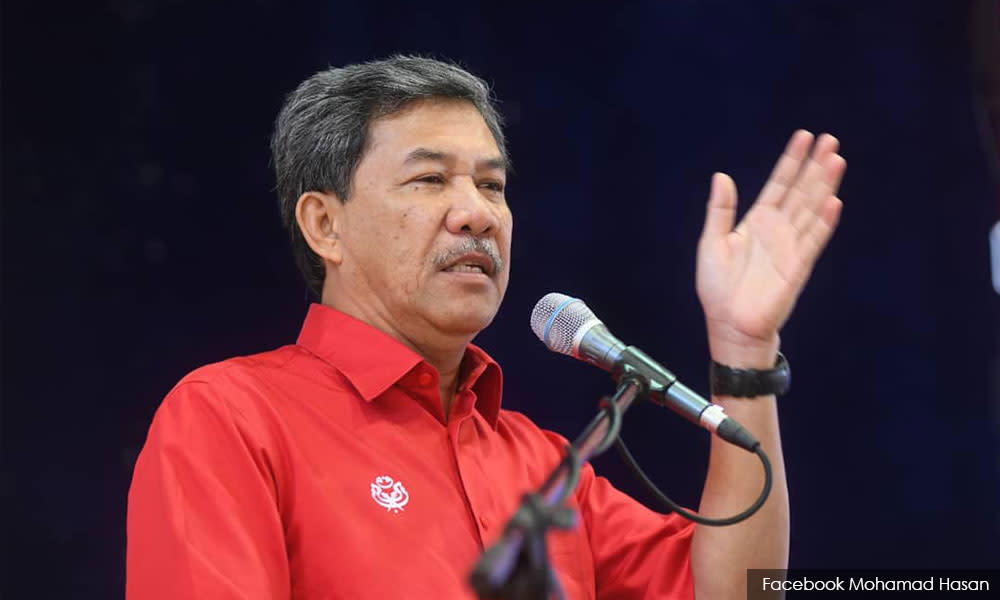'Better charge those who can afford vaccine than tap into fund'

Umno deputy president Mohamad Hasan today suggested that the government charge those who can afford to pay for Covid-19 vaccine.
He came up with the counter-proposal after the government moved to tap into the RM17.4 billion National Trust Fund (KWAN) for the procurement of vaccines and related expenditure.
"The question is, should the Perikatan Nasional government risk the well-being of the future generation and their future survival without exploring other options first?" Mohamad said in a Facebook posting today.
"We can still consider offering free Covid-19 vaccine to those who cannot afford it. As for those who can afford it, they can pay according to market price.
"This may not be the best option, but it is definitely better than gambling on the future of the next generation," he added.
On April 21, Putrajaya used its emergency power to pass a law to use the trust fund to procure vaccines and for any related expenditure.
The trust fund was established in 1988 as the country's natural resource fund and it is managed by Bank Negara. According to the National Trust Fund Report 2018, tabled in Parliament in 2020, the fund has a total value of RM17.4 billion.
Politicians, experts, and civil society have criticised the government's move when RM3 billion was allocated for Covid-19 vaccines under Budget 2021.
Mohamad (above) echoed the concerns raised by critics who questioned the need to utilise the trust fund.
"This is very frustrating and it shows the vulnerability of the government in handling the Covid-19 crisis.
"An amount of RM3 billion has been allocated under Budget 2021 to vaccinate 83 percent of the population, yet no detailed explanation and particulars were given on how the allocation is spent or managed," he said.
Mohamad said the allocation was then increased to RM5 billion with the hope that Malaysia could achieve herd immunity by December 2021, instead of February 2022.
The matter was not discussed between the members of the government administration and lawmakers, he said.
"Moreover, there is no room for the parliamentary select committee to ensure transparency and accountability as Parliament has been suspended."
In a statement today, the Center to Combat Corruption and Cronyism (C4 Center) said although the trust fund could be utilised to purchase public health supplies, it still needed to be disbursed through Parliament for check and balance purposes.
"We join the chorus of voices demanding transparency on what had happened to the RM3 billion announced by Finance Minister Tengku Zafrul Abdul Aziz to procure vaccines.
"We live now in a Malaysia surrounded by multiple corruption scandals, with 'cartels' exposed one after another in the administration of our country, as well as questions about the recovery of assets from the 1MDB fiasco still hanging over Malaysia.
"It is imperative that the government adheres to the highest standards of transparency, and bucks up. The Perikatan Nasional administration must demonstrate its respect for accountable governance if it is to rebuild waning public confidence," C4 Center said.

Meanwhile, Amanah deputy Youth chief Muhammad Faiz Fadzil said the government should increase the savings of the trust fund instead of using it.
This is because the trust fund relied on the funding of its sole contributor, Petronas.
"The RM17 billion savings is much smaller than Petronas' RM1.2 trillion contribution to the government.
"There is a huge gap if we were to compare KWAN to one of the world's largest trust funds - Norway's US$1.2 trillion 'oil trust fund' in 2020," he said.
"The fact is, we don't have enough savings for future generations," he said, adding that Putrajaya estimated the petroleum reserves would deplete as early as 2029.
"The government should increase KWAN's savings instead of spending on those future savings," Muhammad Faiz said.


